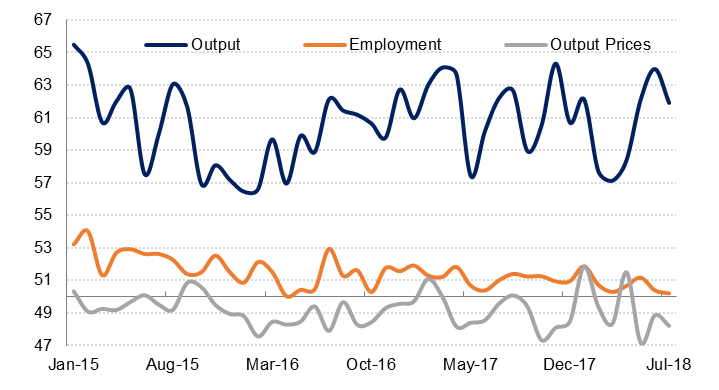
The Emirates NBD Purchasing Managers’ Index (PMI) for the UAE declined to 55.8 in July from 57.1 in June, signalling the slowest rate of growth in the non-oil private sector in three months. Both output and new work, while still strong, were softer than in June. Notably, new export orders increased at the sharpest rate in three years, as firms reported stronger demand from other GCC countries and Europe.
Employment was broadly unchanged last month, with the index barely above the neutral level at 50.2. Year-to-date, the employment index averaged 50.8, compared with 51.2 in the same period last year, and indicating even weaker job growth in the UAE’s non-oil private sector this year relative to 2017. Backlogs of work increased sharply again as a result of the strong rise in new orders (and flat employment), although the rate of increase in backlogs was softer than in June.
While input cost inflation remained relatively modest in July compared with earlier this year, firms continued to lower average selling prices, with output prices declining for the third month in a row. The continued squeeze on firms’ margins is likely a key factor in the soft employment survey, as firms remain under pressure to contain costs and boost efficiency.
Purchasing activity accelerated slightly in July but the actual stock of pre-production inventories was unchanged from June, which suggests that firms may be becoming more efficient in their inventory management. Overall, businesses remain very optimistic about the coming year, with more than 60% of respondents expecting their output to be higher in year’s time. However, this is lower than the May and June surveys.
The average PMI reading in 2017 was 56.1 and recent official estimates show that the UAE’s non-oil sector grew 2.5% last year. Lower oil production meant that headline GDP growth was much lower at 0.8% in 2017. The average PMI year-to-July 2018 is 55.9 (marginally higher than average Jan-July 2017) which suggests that so far this year, non-oil sector growth has been similar to 2017.
However, we are cautiously optimistic that recently announced fiscal stimulus and higher oil prices should boost non-oil growth through the rest of the year. In addition, the UAE has increased oil production in recent months and if this is sustained through the rest of the year, would offset weaker than anticipated non-oil sector growth. We retain our 2.2% GDP growth forecast for the UAE this year.
 Source: IHS Markit, Emirates NBD Research
Source: IHS Markit, Emirates NBD Research